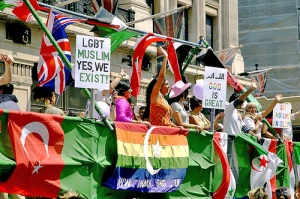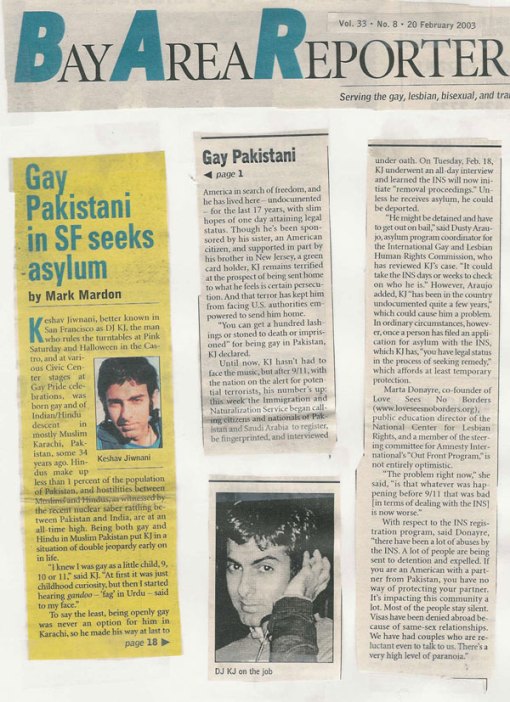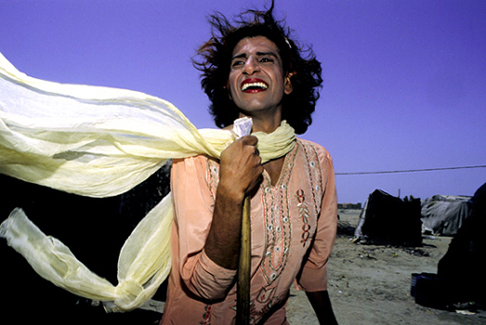“Invisibility” and “Silence” are the hallmark of fascist societies. A national stereotype is built and than implemented through ideological and coercive apparatuses of the state. Gender is an important battle ground in these “nation-building” projects. A section of Pakistan’s founding fathers was already obsessed with “Super-man”, it was recycled as “Merd-e-Momin” of Iqbal during times of General Zia-ul-Haq when Pakistan and United States were creating stunned merd-e-momins to fight the infidel Russia. Destroying a staunchly modern republic of Afghanistan, and purging all liberal-secular thought from Pakistan [where it existed as “Reds”], were only side effects of this policy. The creation of a hyper-masculine gender stereotype of “Merd” Momin” and “Mujahid” as being the stranded criteria for being a “Pakistani” was the main ideological catastrophe of his time. It was a time of systematic gendericide which was done with approval of “liberal” western democracies like UK and USA who supported Zia-ul-Haq and his ruthless islamization. It was also the time of one of the most glorious Leftist-feminist resistance against Imperialism and Islamic fascism. Feminist-leftist poets like Fehmida Riaz and Kishwer Naheed were put on trial for high treason and had to escape from the country. The feminist discourse took a sharp radical turn but its impact of general Pakistani society cant be felt even today because of the state’s selective gender policies. With these policies , women, transgendered , homosexuals and even str8 men who didnt subscribe to “Tripple M” formula, the Merd, Mujahid and Momin slowly became invisible from society. What does it mean to be “different” in terms of gender and sexuality in Islamic Republic of Pakistan is very important to understand. These people have a very vibrant but invisible existence in Pakistan. They are all around us, but we dont see. Invisibility has given them security to live a life otherwise impossible in the Islamic Republic, to make websites and to throw parties . The cost is to become a non-being, to wear a giant cloak of invisibility of dont-ask-dont-tell. The result on society as a whole is disastrous, its becoming more monolithic than ever. Recent Supreme Court’s decisions has declared transgendered people “disabled”. The silence and invisibility paved the roads to Auschwitz. Those who were gassed were not only Jews and commies but also gays and “disabled”
Shaheryar Ali
Nuwas Manto gives a touching personal account on what it means to be gay in a deeply religious and conservative country like Pakistan, where homosexuality is considered a sin and male effeminacy scoffed upon.The article was published in The Pink Pages , India’s fist Gay magazine. Mr Manto hails from Lahore, the self designated cultural hub of Islamic Republic of Pakistan. He is a young student who defines himself as a “secular-humanist” and he blogs at A Pakistani-Humanist Blog.
Being Gay in Pakistan
Nuwas Manto
In Pakistan the word ‘gay’ is synonymous with the word ‘eunuch’. It doesn’t really matter whether you have a penis or not. One of my friends quite sincerely, in order to identify my sexual orientation, asked me if I get erected and if I ejaculate. Upon receiving a positive response he thereby concluded there is no way that I can be gay. Of course, it doesn’t matter if one gets erected while watching gay porn or straight porn. That has nothing to do with his sexuality. Poor Kinsey. Such an easy and traditional method to identify sexuality and he spent years on research!
But this unscientific approach towards human sexuality is not limited only to my friend, but to a majority of Pakistanis, who view Islam and homosexuality as being mutually incompatible. It’s none of their business what the heck science has to say when it comes to diversity in sexual orientation. What matters is the word of Allah, the Supreme Being. I am not trying to be anti-religion, but anti-Irrationalism. Twenty years ago, it was a rare sight to see a woman driving on the roads of Lahore. Today it’s impossible not to see one, or else you are not in Pakistan. But even today if a woman gets divorced, or worse, if she demands a divorce she is considered to be a shame, in the former case, or a slut, in the latter. According to a family friend of mine, those women who can’t be good housewives can’t be good women at all. So, I guess those men who can’t be good husbands can’t be good men too. Hey wait! World, we are out of good men in Pakistan!
But of course, men are men. You see, there is no harm if straight men penetrate into the backs of these filthy gay men. After all, they are the ones penetrating, not being penetrated into. In Pakistan there is no concept of diversity in homosexuality: ‘Top’, ‘bottom’, ‘versatile’. Every gay man is a bottom. I myself, seemed to believe this till I met some who really were not. Due to lack of knowledge concerning the field of human sexuality, there is a belief that homosexuality is based upon lust, not love. That is the information that heterosexist minds are fed upon. In my country, as I explained before, there is no difference between a eunuch (hijra) and a homosexual man (not gay woman). Therefore if you get into a fight with a gay man there is always the best way to insult him. This most astonishing word that the founders of the Urdu language ever created: Khusra! I have become used to hearing it. During school, because of my effeminacy was made fun of. My family has always been, and I guess will always go on to till I don’t change myself, tell me how I should become more manly. How I should talk, walk, speak, eat, hold the glass, and the list goes on. I am told that I can’t be open about my sexual orientation because that would bring shame to my family. After coming out and writing openly on facebook about my sexual orientation and my non-religiosity, my brother sent me a furious message from the UK telling me to better mend my ways before he kills me for defaming the name of my father .Of course many homosexuals take their own life! When your family is not supportive, when some of your friends hold on to you (but still view homosexuality as a disease they must tolerate), when many people who are in a process of becoming good friends of yours stop talking to you the very next day after you told you’re gay, there seems to be no other way out but to kill yourself.

Muslim Gay Pride,London
But then that sort of humiliation is not limited to your enemies only, but also extends to your family. Whenever there is a fight between me and my sisters, they have one word to shut me up. Yes! You guessed it right: Gay. Why am I telling you my story while my task was to inform my Indian friends about the gay subculture in Pakistan? Well, my story speaks for many. However I am still lucky. I know what gay rights are. I know what I must demand from this world. I know it’s okay to be gay, and although I am an Atheist now, I also know that it’s okay to be gay and Muslim at the same time. I have done research on Islam and homosexuality to some extent and so I believe that homosexuals can live peacefully in the Islamic world only if the interpretations of the story of Lot are done in a way that is devoid of bigotry and hatred.
But many homosexuals don’t know that. They are happy to be gay and perform namaz five times a day as long as there is no mention of homosexuality and the name of Islam together, whether in a homophobic tone, or in that of advocacy. If that happens they are torn between sexuality and religion, both of which are equally important in a man’s life. You must not be surprised when I tell you that when I talked about re-interpretation of the Quran in order to reconcile homosexuality and Islam, there is no way they can digest such an idea. How can all the Ulema be wrong? And more importantly, there seems to be such a crystal clear mention of homosexuality as a sin in the Quran. Guess what, there is no word for homosexuality in the book! The words used to describe it are anything but ‘homosexuality’. The closest that it comes to is the incident where Lot asks the people whether they would give up the woman that God had given them, for men (his guests, who were Angels in reality subsequently came to inform him of his near destruction). Now there can be various interpretations of that. But even when you ask you anti-gay or confused homosexual friends to quote where in the Quran there is a direct reference to homosexuality, and when they are unable to do so, they find it hard to absorb the information. Okay, I understand. Twenty years of radical anti-gay brainwashing isn’t going away in a day or two. But what really piques me is the fact that in order to defend their religion orientated homophobia, my people would even go on to defy scientific evidence.
But not all is bad. More and more people now believe that gays should have rights to a proper life too, although not in a large numbers. Again, as long as homosexuality and religion are not brought face to face, people won’t be ready to tolerate homosexuality. Now when homosexuality is discussed in relation to Islam, there is an obvious defensive behaviour. What is really funny is that these same people forget their Allah’s divine anti-gay verses when they are offered a blowjob! I have tested at least two guys who went to lengths to explain to me why Allah hates homosexuals. But when I offered to have sex with them , they didn’t lose a second to accept it. (Of course I didn’t have sex with them. I have some self-respect you know!)
The female homosexual scene is almost non-existent. Lesbians seem to not exist at all. Therefore they can be saved from the general wrath of society when they dress like boys and act like one. There is no concept of tomboyish girls being lesbians, although there is a strong notion that all effeminate men are gays and all gays are effeminate (something that I must admit even I used to believe at one point of time). But returning to the discussion of Pakistani gay woman, I seldom hear about a lesbian, and have never heard about an out and proud one. But my poor sisters suffer from two kinds of discrimination: based upon both gender and sexual orientation.
My Indian friends must have noted that Pakistani Gay sub-culture is not much different from that of the Indian one, nor are our fears, hopes and everyday toils. Therefore, we must erase the international borderlines with love and respect towards one another, and work towards helping our brothers and sisters live a life of bliss regardless of their nationality, sexuality, religion, or ethnicity.

 There has been little serious discussion of this SC ruling online or in the print media: no speculation whatsoever over the meaning of gender in Pakistan, or whether this ruling is right in creating a hijra subject for the purposes of bureaucracy. What is going to constitute ‘the Third sex’? And what happens to those who do not qualify for this category? What about those ‘gender-confused’ people who do not want to be identified as ‘Third sex’, preferring instead to be identified as ‘male’ or ‘female’?. According to the article quoted above, the hijra are ‘left by the society to live by begging, dancing and prostitution’, to be exploited by the ‘self-styled guru’ – does it mean that after this ‘social uplift’ program, they will be made to give up their lifetyle? What if they can’t? Does discrimination go away after formal barriers to progress have been removed, or does it merely become invisible and more difficult to fight? With the avenus of empowerment formally open to them, wouldn’t the society find it easier to blame them if their ‘begging and dancing and prostitution’ continues? Will they be persecuted or will we realize that a ‘respectable’ life is just not possible for the hijra without a radical change in the society, its institutions and maybe our ideas of ‘respectable’?
There has been little serious discussion of this SC ruling online or in the print media: no speculation whatsoever over the meaning of gender in Pakistan, or whether this ruling is right in creating a hijra subject for the purposes of bureaucracy. What is going to constitute ‘the Third sex’? And what happens to those who do not qualify for this category? What about those ‘gender-confused’ people who do not want to be identified as ‘Third sex’, preferring instead to be identified as ‘male’ or ‘female’?. According to the article quoted above, the hijra are ‘left by the society to live by begging, dancing and prostitution’, to be exploited by the ‘self-styled guru’ – does it mean that after this ‘social uplift’ program, they will be made to give up their lifetyle? What if they can’t? Does discrimination go away after formal barriers to progress have been removed, or does it merely become invisible and more difficult to fight? With the avenus of empowerment formally open to them, wouldn’t the society find it easier to blame them if their ‘begging and dancing and prostitution’ continues? Will they be persecuted or will we realize that a ‘respectable’ life is just not possible for the hijra without a radical change in the society, its institutions and maybe our ideas of ‘respectable’?












